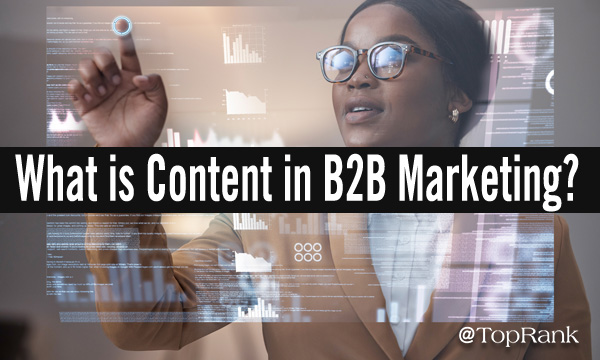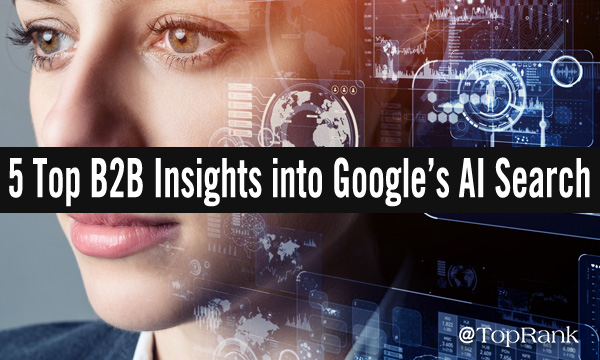

What will Google’s generative artificial intelligence (AI) search future look like, and will the search giant be able to make good on its goals of aligning its systems to principled human values? Google recently set forth plans to expand its generative AI search technology offerings, laying out an initiative code-named
Project Magi, which could have a limited roll-out as early as May 2023, while its all-new generative AI-powered search experience has been slated to arrive sometime after. “Working on AI at Google literally feels like you’re living in the future. It’s one of the most exciting things I’ve done in my career,”
Marvin Chow, vice president of global marketing at Google, recently
noted. “History shows that we will under-estimate the long term possibilities but over-estimate the short term impact. Regardless, all of our lives are about to go through a rapid evolution of change that will make things easier, make us smile but also make us question our responsibility to society and our community,” Chow observed. [bctt tweet="“Working on AI at Google literally feels like you’re living in the future. It’s one of the most exciting things I’ve done in my career.” — Marvin Chow @theREALmarvin" username="toprank"] Google’s long-standing dominance in search has undergone a certain amount of foundation-shaking turbulence with Bing’s public launch of its AI-infused search offerings, and with several of Google’s lucrative search partnership contracts including Apple and Samsung up for renewal in 2023,
this will likely go down as the year the search giant faced the most disruption since it rose to the top of the search mountain.
Search Is Most-Desired AI Feature
It should come as no surprise that the AI-driven product a leading 49 percent of U.S. adults were most interested in came in the form of AI-powered online search, according to recently-published survey
data.
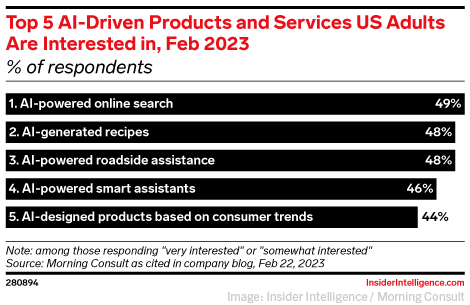
In in the B2B sector — with its longer buying cycles and greater number of touch-points than in the B2C world, a better search experience thanks to generative AI could be especially welcome, as B2B buyers seek to find information about generally more complex products and services. Marketers have traditionally made search a component of brand promotion strategies, in both non-paid organic and paid search advertising, with Google long holding the undisputed dominant role in search.
76 percent of U.S. advertising buyers noted that ads placed alongside Google search had the highest return on investment (ROI), according to Cowen survey data, and recent WARC survey data has shown that
53 percent of marketers expect to boost spending with Google in 2023 — a figure that is down from the 59 percent seen in 2022 — with some
11 percent planning to increase spending with Bing. An increase of 27 percent during 2023 over 2022 global spending on AI has been predicted, with
2023 spending set to climb to $154 billion — an increase of more than $30 billion year-over-year — while overall AI spending is expected to eventually top the $300 billion mark by 2026, according to newly-published IDC forecast data, as we
recently covered in our weekly Elevate B2B Marketing News. 52 percent of search industry practitioners have said that AI will be extremely important when it comes to delivering relevant search results in the future, according to newly-published survey
data.
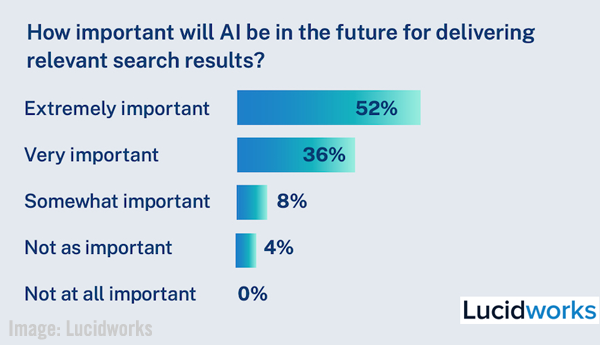
Despite Challenges AI Content Labeling Is Expected
Adding AI to its search offerings sees Google facing many of the same challenges and considerations that Microsoft and other firms also face. Recent Gartner data has shown that while consumers presently expected a certain level of misinformation to appear within AI-generated content, there was
an expectation for organizations using AI-built content to clearly label it as such. “All these businesses have a big task ahead of them to make sure that what they’re doing in generative AI is very plainly disclosed to the consumers that are interacting with them,”
Debra Aho Williamson, principal analyst at Insider Intelligence recently
observed. [bctt tweet="“All these businesses have a big task ahead of them to make sure that what they’re doing in generative AI is very plainly disclosed to the consumers that are interacting with them.” — Debra Aho Williamson @DebraWilliamson" username="toprank"] Garner’s data also showed that
85 percent of consumers had only “some trust” or “no trust” in AI-generation search results. There are also growing concerns among marketers at having content plagiarized under the guise of AI training. Social news aggregator and discussion platform Reddit recently became one of the first organizations to implement restrictions on the open use of its content archive for training AI services, through the use of an application programming interface (API) that will charge firms using the platform for AI training, as
Kevin Purdy, technology reporter and product specialist at Ars Technica recently explored in “
Reddit will start charging AI models learning from its extremely human archives.” With both Google Bard and ChatGPT having named Reddit as a source of existing AI training, it’s unclear how or if AI training sources will have a legal mechanism to retroactively charge for that previous training, or to request that its data be removed. Recent AI add-ons have been included in product updates from Mailchimp, GoDaddy, among many other technology organizations. A recent joint
study from Sprout Social and Cint found that
71 percent of social media marketers have started using AI and machine augmented learning (MAL) tools, with
82 percent of that group reporting positive results including increased productivity, higher accuracy, and swifter content curation, with
14 percent having noted that it was too early to say. “We view generative AI as one of the most meaningful technology innovations in our career,” Baird Equity Research analysts noted, according to a recent piece by
Laurie Sullivan, senior writer and editor at MediaPost, exploring the large impact that AI is having on technology, in “
Generative AI Most Transformative Technology On Par With The Internet.” It is in this light that I asked five top industry leaders involved in B2B marketing and search to share their thoughts on what they expect Google’s AI search future will look like, and whether they believe the search giant will be able to make good on its goal of aligning its systems to beneficial human values. Let’s jump right in and see what marketing and search innovators are expecting from Google throughout 2023 and beyond.
1 — A False Fabric of Truth in the Machine
 Dixon Jones
Dixon Jones CEO, inLinks I believe that Google will not miss the boat around generative AI, in spite of the early lead from ChatGPT and Bing. I do, however, see that keeping bias and errors out of the output is extremely hard to do consistently. The technologies are based largely on what humans have said about the world that they live in. Humans make fundamental mistakes, for one thing. We used to think the universe revolved around the earth. How absurd is that notion now? So what mistakes are we currently making in our view of the world? These mistakes then become part of a false fabric of truth in the machine. The second issue is that the underlying data (web content) is written by people trying to push an agenda, not by people trying to balance truth and uncover facts. My third concern is one of power. Some topics and groups in society generate much more data than others, which in turn will abnormally increase their “
presence” in the outputs from the machines. The USA will get more exposure than (say) South Africa. Why should this be, in a “
fair” representation of the world? [bctt tweet="“I believe that Google will not miss the boat around generative AI, in spite of the early lead from ChatGPT and Bing.” — Dixon Jones @Dixon_Jones" username="toprank"]
2 — Google AI Changes Will Arrive in Stages
 Barry Schwartz
Barry Schwartz CEO, RustyBrick Founder, Search Engine Roundtable I don’t think Google even knows how AI will change how search looks and feels in the future. We see a lot of experimentation, mostly from Bing right now, and then a lot of PR buzz from Google executives on the topic. One thing is for sure, there will be change and it will happen in stages. First we will see elements of AI chat features across Google Search and Bing Search, while also bridging it back from the chat feature directly into search. Then we may see chat based answers, maybe in place of featured snippets. We know ads will be baked into both experiences. Times are changing and it is super exciting to be watching the changes happen in real time. [bctt tweet="“I don’t think Google even knows how AI will change how search looks and feels in the future. One thing is for sure, there will be change and it will happen in stages.” — Barry Schwartz @rustybrick" username="toprank"]
3 — A Fluid Future With Opportunity & Ethics Concerns
 Neil Marshall
Neil Marshall Administrator, WebmasterWorld Co-Founder, Marshall Jennings PR As of today, it’s clear that Bard is lagging behind OpenAI’s offering in some respects: Bard has a more recent data set but seems less creative, and that’s why the search leader is putting in a great deal of effort to catch up with Bing’s lead. The future looks a little fluid right now because this technology can do some things very well and others not so good. For sure, Google’s team will be working hard on monetization opportunities. This is disruptive technology, and there’s a great deal more to come, along with pressure from the ethics lobby and eventually legislators getting involved. [bctt tweet="“Bard is lagging behind OpenAI’s offering in some respects: Bard has a more recent data set but seems less creative, and that’s why Google is putting in a great deal of effort to catch up with Bing’s lead.” — Neil Marshall @engine" username="toprank"]
4 — Taking Greater Chances & A Star Trek Computer Paradigm
 Roger Montti
Roger Montti Independent, Search Engine Journal Owner, Martinibuster.com In a way we're already living in Google's iteration of AI in search. It's in products like Google Maps and Google Lens. AI also plays a role in search at the back-end indexing phase and on the front-end where the algorithm creates the search results, all invisibly in the form of Google's SpamBrain AI system. Google's approach to AI has consistently been in an invisible form within the traditional user workflow: Ask a question, get an answer. But that's the old paradigm. What will the new paradigm look like is what we want to know, right? Given that a fully conversational search has long been the goal of Google's founders, Sergey Brin and Larry Page, I would answer that this is where Google is heading. The future of search, ironically, is going to look like the fictional future from the past. Google's inspiration for over ten years has been the Star Trek computer where users invoke a wake-up prompt, "
Computer..." and then ask a question. The Star Trek computer is a natural form of interaction, much like speaking to a human. The Star Trek computer is an information assistant, which is what Google aspires to be. Initial attempts to do this on mobile devices have been limited to asking your phone a question and Google answers by speaking passages from websites that answer those questions. That wasn't AI — it was a kind of fake-out simulation of the Star Trek Computer (a computer with a lower-case "c"). That old fake-out version will in the future, in my opinion, be enhanced by AI. This goes beyond reading what's on web pages and fully crafting spoken responses, summaries, in natural language. This question is about what to expect for search, but I would expand that question into other domains like shopping. In that kind of scenario structured data "
might" gain more importance at first in order to help teach the AI that its assumptions are correct, like training wheels. But at some point it may not need the structured data training wheels. Maybe it doesn't already need structured data. Lastly, Google is generally portrayed as scrambling to catch up to Bing but that's not, in my opinion, an accurate portrayal of the reality of what's happening. Google already has the technology, since at least the spring of 2022, to achieve fully conversational AI search. And it's not just proof-of-concept technology either. Google researchers have already created state of the art level technology. The bottleneck was a lack of leadership and vision. In my opinion Google lost ground when Alphabet selected the current CEO who is a technology person and not a business-oriented visionary planning moves ten steps ahead. This was evident in the recent all-hands meeting where the questions by employees indicated that they had no idea what Bard was going to be. That's the result of a lack of vision and leadership. Google used to lead but that is obviously no longer the case. So maybe this is a wake up call for Google to take this technology it already has and move forward with that Star Trek computer paradigm and start taking chances. [bctt tweet="“Google already has the technology to achieve fully conversational AI search. And it's not just proof-of-concept technology either. Google researchers have already created state of the art level technology.” — Roger Montii @martinibuster" username="toprank"]
5 — Better User Experiences Co-Existing With Human Values
 Darwin Santos
Darwin Santos Senior Technical SEO Specialist, Amsive Digital Google stands to enhance the effectiveness of search results significantly by further integrating AI technologies into its search engine. We've already observed how search platforms like Bing provide a more satisfying user experience for some kinds of informational queries. However, it is important to note that not every search can be addressed just as effectively through chat-like interactions; some situations still call for traditional search results. As the dominant player, commanding over 93 percent of the market share, Google must exercise prudence. AI systems' inherent nature — with their potential to generate hallucinations and difficulty in controlling outputs — necessitates caution. By anchoring its responses in well-grounded facts, Google has the opportunity to develop a superior product that genuinely aligns with human values and needs. [bctt tweet="“By anchoring its responses in well-grounded facts, Google has the opportunity to develop a superior product that genuinely aligns with human values and needs.” — Darwin Santos" username="toprank"]
Can Google’s AI Search Future Help Turn B2B to Being-2-Being?
With all of the industry murmurations surrounding Google's forthcoming generative AI search offerings, a sense of something foundational is in the air among B2B marketers. Next year will be 40 years since I started working in online communications operating a 300-baud computer bulletin board system (BBS), and 2023 is most definitely an extremely exciting time in the evolution of not only search but technology's overall impact on humanity. I hope this look at Google's AI search future will help inform your own B2B marketing efforts, as more marketers learn to both harness the power of AI and to place newfound value of our uniquely human qualities. It's long been said that
B2B could more aptly be referred to as human-to-human interactions, and as AI has proliferated I tend to see
B2B also taking on more being-to-being characteristics, and search from Google and other firms will continue to play a key role in connecting us all. To learn more about B2B search marketing and AI, be sure to also check out these additional articles we've recently published on the topics:
More than ever before, creating award-winning B2B search marketing that elevates, gives voice to talent, and humanizes with authenticity takes considerable time and effort, which is why more brands are choosing to work with a top digital marketing agency such as TopRank Marketing.
Reach out to learn how we can help, as we’ve done for over 20 years for businesses ranging from LinkedIn, Dell and 3M to Adobe, Oracle, monday.com and many others.
The post Turning B2B to Being-2-Being: 5 Top Insights B2B Marketers Need To Know About Google’s AI Search Future appeared first on B2B Marketing Blog - TopRank®.
from B2B Marketing Blog – TopRank® https://ift.tt/up34IhK
via
IFTTT
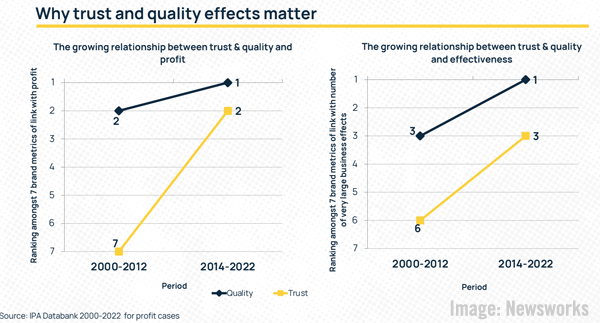
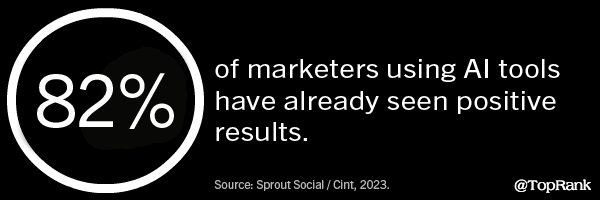 Marketing Has Taken on More Responsibilities Since the Pandemic 41.4 percent of chief marketing officers have said that they now see marketing as being responsible for revenue growth, a figure that was up from the 32.7 percent mark recorded in 2020, while 91.4 pinpointed brand, advertising, and digital marketing efforts as the primary responsibilities of marketing, according to newly-published survey data of interest to B2B marketers.
Marketing Has Taken on More Responsibilities Since the Pandemic 41.4 percent of chief marketing officers have said that they now see marketing as being responsible for revenue growth, a figure that was up from the 32.7 percent mark recorded in 2020, while 91.4 pinpointed brand, advertising, and digital marketing efforts as the primary responsibilities of marketing, according to newly-published survey data of interest to B2B marketers. 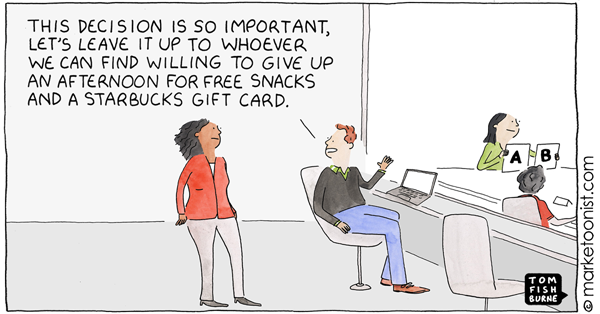 A lighthearted look at “Focus Groups and the Oracles of Eden Prairie” by Marketoonist Tom Fishburne —
A lighthearted look at “Focus Groups and the Oracles of Eden Prairie” by Marketoonist Tom Fishburne — 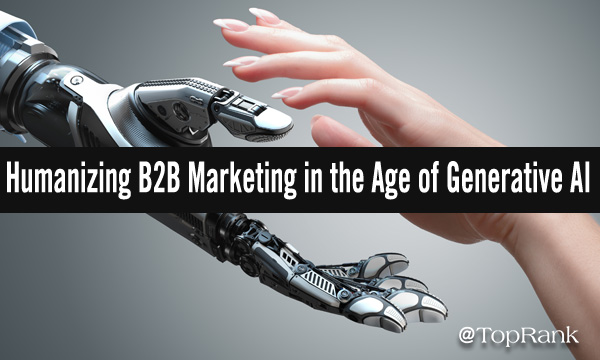

 In in the B2B sector — with its longer buying cycles and greater number of touch-points than in the B2C world, a better search experience thanks to generative AI could be especially welcome, as B2B buyers seek to find information about generally more complex products and services. Marketers have traditionally made search a component of brand promotion strategies, in both non-paid organic and paid search advertising, with Google long holding the undisputed dominant role in search. 76 percent of U.S. advertising buyers noted that ads placed alongside Google search had the highest return on investment (ROI), according to Cowen survey data, and recent WARC survey data has shown that 53 percent of marketers expect to boost spending with Google in 2023 — a figure that is down from the 59 percent seen in 2022 — with some 11 percent planning to increase spending with Bing. An increase of 27 percent during 2023 over 2022 global spending on AI has been predicted, with 2023 spending set to climb to $154 billion — an increase of more than $30 billion year-over-year — while overall AI spending is expected to eventually top the $300 billion mark by 2026, according to newly-published IDC forecast data, as we
In in the B2B sector — with its longer buying cycles and greater number of touch-points than in the B2C world, a better search experience thanks to generative AI could be especially welcome, as B2B buyers seek to find information about generally more complex products and services. Marketers have traditionally made search a component of brand promotion strategies, in both non-paid organic and paid search advertising, with Google long holding the undisputed dominant role in search. 76 percent of U.S. advertising buyers noted that ads placed alongside Google search had the highest return on investment (ROI), according to Cowen survey data, and recent WARC survey data has shown that 53 percent of marketers expect to boost spending with Google in 2023 — a figure that is down from the 59 percent seen in 2022 — with some 11 percent planning to increase spending with Bing. An increase of 27 percent during 2023 over 2022 global spending on AI has been predicted, with 2023 spending set to climb to $154 billion — an increase of more than $30 billion year-over-year — while overall AI spending is expected to eventually top the $300 billion mark by 2026, according to newly-published IDC forecast data, as we 






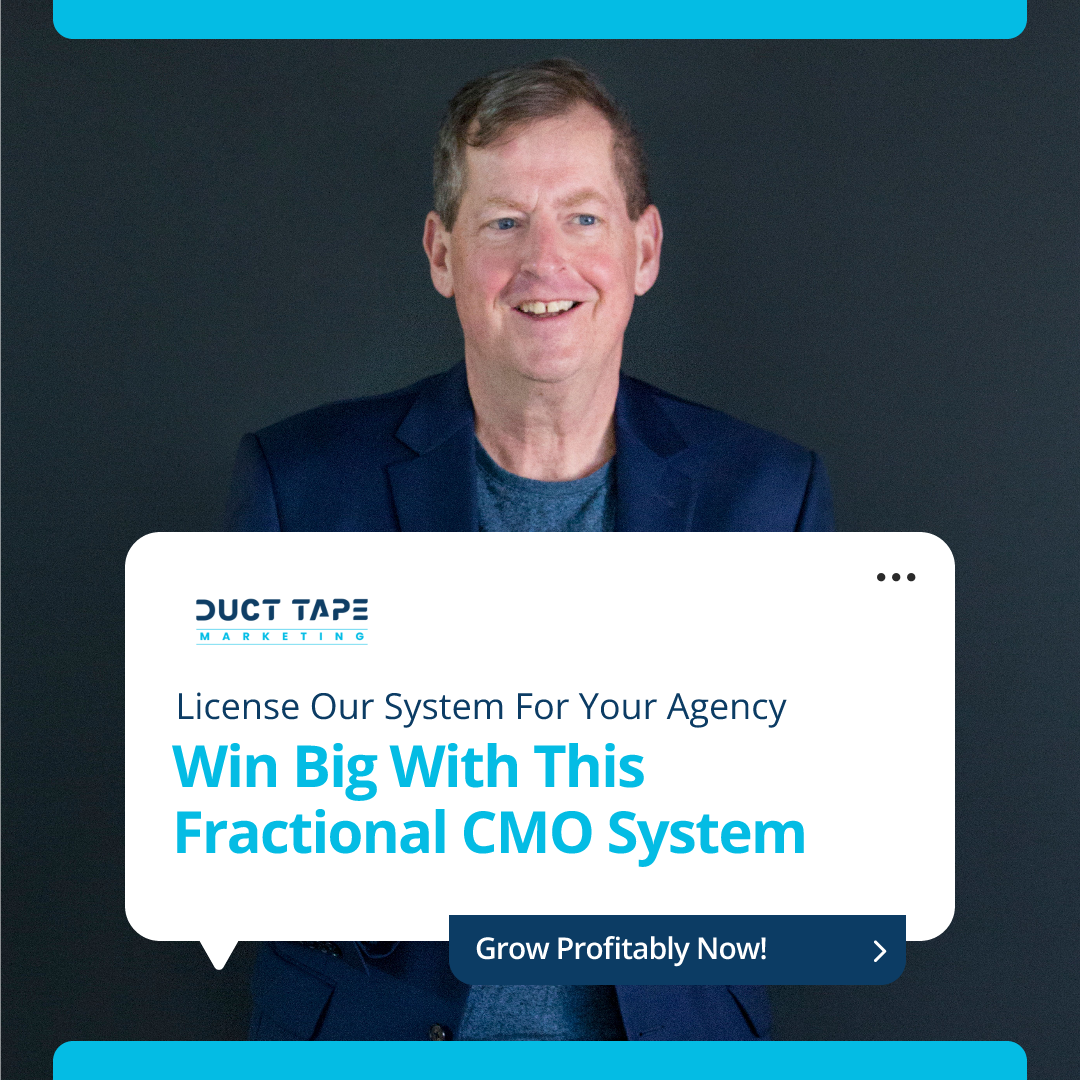

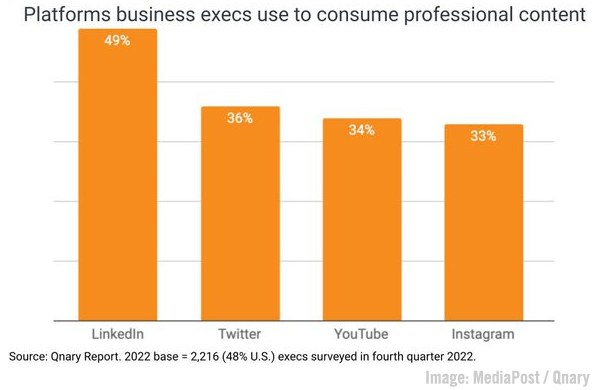
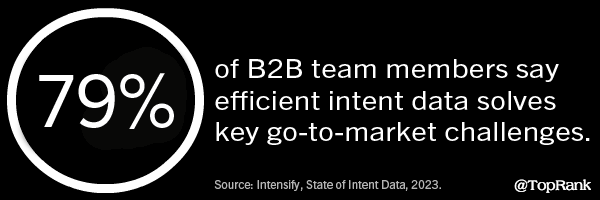 Google planning new search engine while working on new search features under Project Magi Search giant Google has set forth plans to expand its AI offerings with its Project Magi initiative, which could have a limited roll-out as early as May, while Google’s all-new generative AI-powered search is expected to arrive after May, Google recently announced.
Google planning new search engine while working on new search features under Project Magi Search giant Google has set forth plans to expand its AI offerings with its Project Magi initiative, which could have a limited roll-out as early as May, while Google’s all-new generative AI-powered search is expected to arrive after May, Google recently announced. 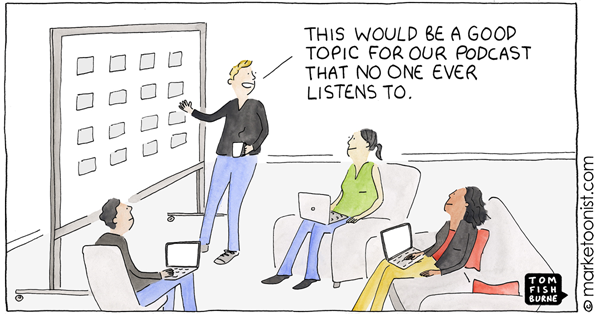 A lighthearted look at “Podcasts for Everyone” by Marketoonist Tom Fishburne —
A lighthearted look at “Podcasts for Everyone” by Marketoonist Tom Fishburne — 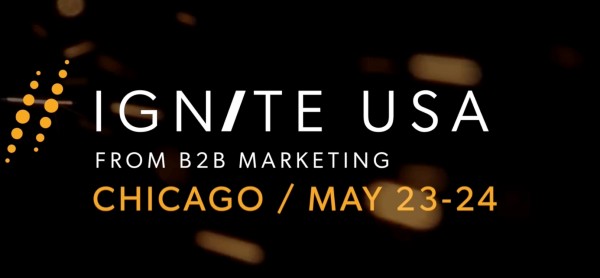
 Nothing works anymore: Why B2B needs a new playbook
Nothing works anymore: Why B2B needs a new playbook  Dawn of the next-gen B2B marketer
Dawn of the next-gen B2B marketer  Using content as evidence of your most important claims
Using content as evidence of your most important claims  Marketing's role in creating an inclusive future: Workforce + supplier diversity
Marketing's role in creating an inclusive future: Workforce + supplier diversity  The new frontier of B2B influence: Inside out
The new frontier of B2B influence: Inside out  Why B2B and Behavioural Science need each other
Why B2B and Behavioural Science need each other  The marketing singularity: Large language models and the end of marketing as you knew it
The marketing singularity: Large language models and the end of marketing as you knew it  Ten steps to customer reactivation
Ten steps to customer reactivation  Strategy and swinging for the fences…
Strategy and swinging for the fences… 